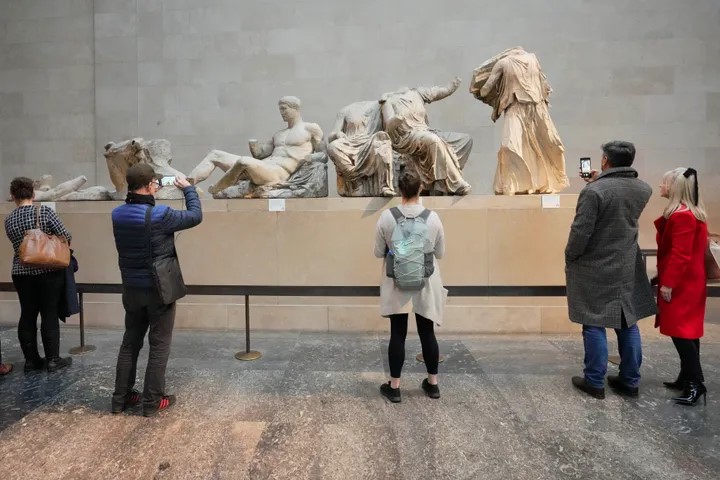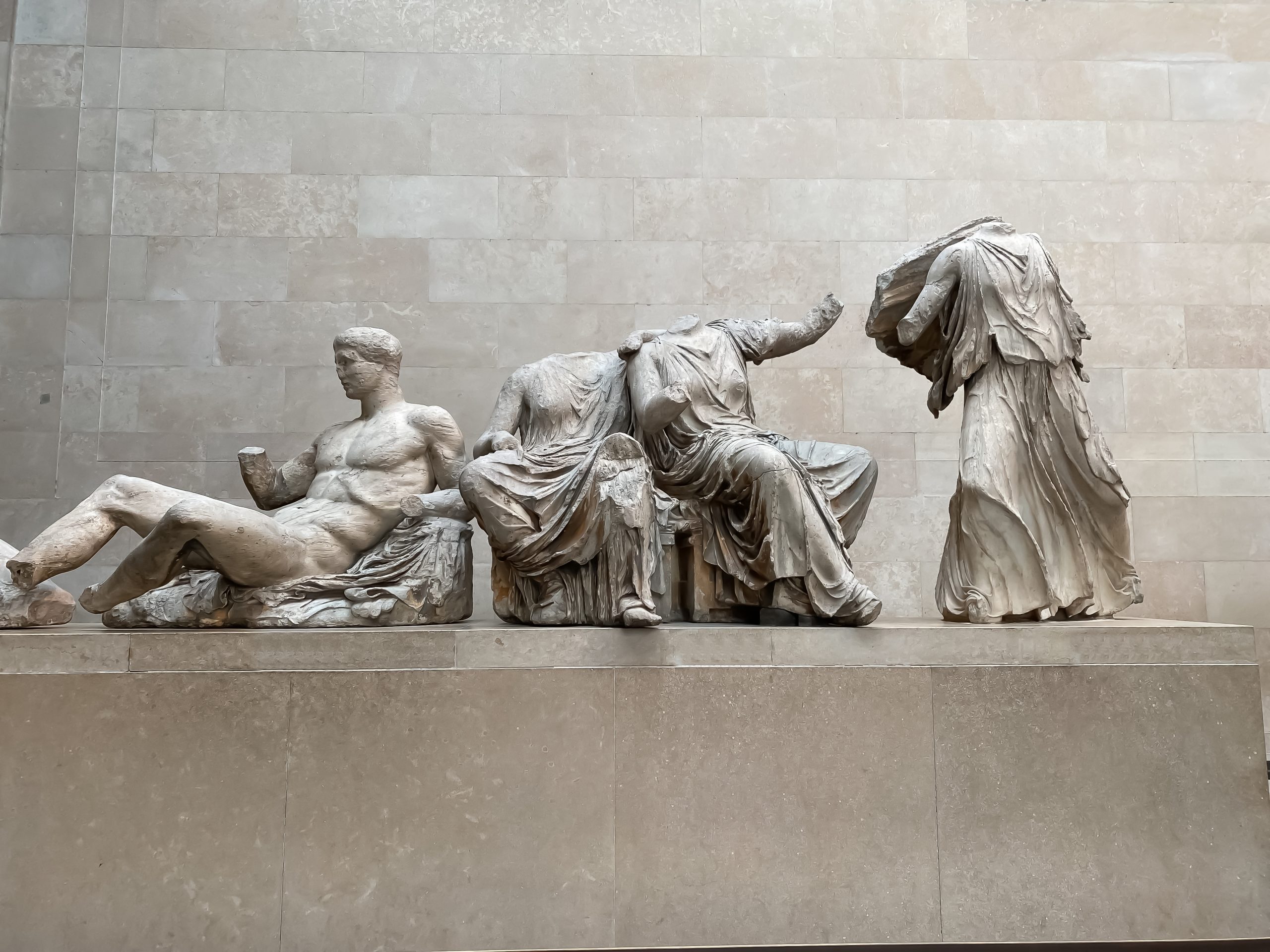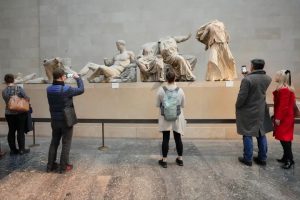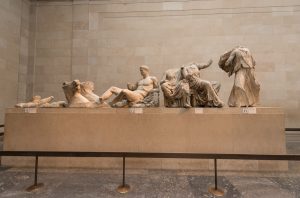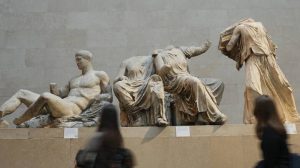Greek Prime Minister Kyriakos Mitsotakis is scheduled to meet with British prime minister, Keir Starmer on Tuesday, and high on the agenda for the Greek premier is the ongoing dispute regarding the Parthenon Marbles.
Greece has argued for almost two hundred years that the collection of marbles should be returned to Athens, while the British Museum has maintained they belong in their collections.
In total 17 pedimental figures, 15 metope sculptures, and large sections of the north and south friezes from the Parthenon are housed in the British Museum. They were first removed from the Acropolis by Lord Elgin, then serving as British ambassador to the Ottoman Empire that controlled the territory of Greece at the time.
The British Museum asserts that Lord Elgin obtained a legal permit from the authorities of the time to remove the marbles and that a parliamentary committee investigated and approved his actions before the museum purchased them. Additionally, the museum contends that keeping the marbles in their collection has protected them from deterioration they could have faced outside on the rock of the Acropolis. They also emphasize the marbles’ status as part of a shared global heritage, suggesting they are best exhibited in the British Museum.
In contrast, Greece argues that Elgin’s permit did not in fact authorize the removal of the sculptures and further that any permission granted by an occupying power (such as the Ottomans) lacks legal validity. Greece views the marbles as integral to its cultural heritage and argues that they are most appropriately displayed alongside the rest of the Parthenon sculptures for historical and contextual integrity. The Parthenon museum has created state-of-the-art exhibits with spaces for each of the marbles to sit should the be returned.
So how exactly has this debate changed over years? Here is one, though not fully comprehensive, timeline:
- 1801: Lord Elgin, begins the project of sawing sections of the Parthenon friezes, a Caryatid, and a column from the Erechtheion.
- 1816: Elgin sells the marbles to the British Museum, a parliamentary committee investigates and approves the purchase.
- 1830: Following Greece’s independence, the country begins efforts to reclaim the Parthenon Marbles.
- 1963: British parliament passes the Museum Act, which says the British Museum cannot “remove or return any object from the collection unless it is a duplicate, physically damaged, ‘unfit to remain in the collection,’ or no longer of public interest.”
- 1979: Research reveals that air pollution is causing decay and disfigurement of the Acropolis structures in Athens, a point often cited by the British Museum to justify retaining the marbles for preservation.
- 1983: Greek Minister of Culture Melina Merkouri makes the first official request for the marbles’ return, making the issue a personal mission.
- 1984: The British government refuses Merkouri’s request.
- 1986: Merkouri delivers a famous speech at the Oxford Union, emphasizing the marbles’ significance to Greece, stating, “You must understand what the Parthenon Marbles mean to us. They are our pride. They are our sacrifices.”
- 1996: A UK television poll reports that 91% of the British public supports returning the marbles.
- January 1999: A majority of Members of the European Parliament (339 out of 626) sign a petition urging the British Museum to return the marbles to Greece.
- November 2002: Greek Minister of Culture Evangelos Venizelos meets British Museum Director Neil MacGregor, marking the first official discussion between the museum and the Greek government. The request to return the marbles is denied.
- 2006: The University of Heidelberg returns a fragment of the Parthenon’s north frieze to Greece, citing the Parthenon’s global cultural significance.
- 2009: Greece inaugurates the state-of-the-art Acropolis Museum, designed with space specifically for the marbles.
- July 2014: Greece appeals to UNESCO to mediate the dispute, but the British government declines the proposal.
- October 2014: Lawyer Amal Clooney joins the legal team advocating for the marbles’ return.
- May 2015: The international legal team advises Greece to bring the case to the International Criminal Court, but the Greek declines this approach.
- 2018: Images of water leakage in the British Museum’s Greek galleries circulate in Greek media. The museum states that the sculptures were not damaged and that the issue has been resolved.
- October 2021: UNESCO’s advisory board recommends that the British Museum reconsider its stance on the marbles.
- November 2021: Greek Prime Minister Kyriakos Mitsotakis meets with Boris Johnson to request the marbles’ return. Johnson states it is the British Museum’s decision.
- November 2023: George Osborne, chairman of the British Museum’s (BM) trustees, gives a speech stating he hopes the British museum “can reach an agreement with Greece”, for at least some of the sculptures “to be seen in Athens”. He suggested a possible exchange of loaned objects
- November 2023: Then UK Prime Minister Rishi Sunak cancels the meeting with Greek PM Mitsotakis, and the two do not discuss the marbles.
According to the Economist, now may finally be the time that there could be some progress on the issue. Public opinion in the UK is largely in favor of the marbles returning to Athens, and Keir Starmer has stated he would let any deal between the British Museum and Athens go forth.
The Greeks are certainly hoping that after so many years, the discussion may start to shift.
